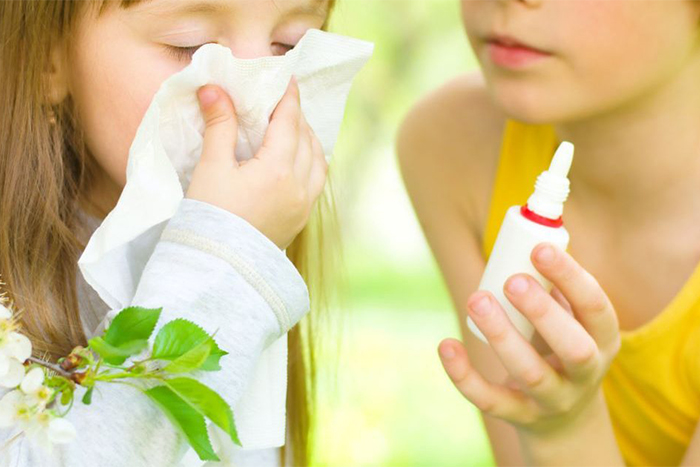
An allergen is an otherwise harmless substance that causes an allergic reaction. Allergic rhinitis, or hay fever, is an allergic response to specific allergens. Pollen is the most common allergen in seasonal allergic rhinitis. These are allergy symptoms that occur with the change of seasons.
Nearly 8 percent of adults in the United States experience allergic rhinitis of some kind, according to the American Academy of Allergy, Asthma & Immunology (AAAAI). Between 10 and 30 percent of the worldwide population may also have allergic rhinitis.
Symptoms
Common symptoms of allergic rhinitis include:
You’ll usually feel one or more of these symptoms immediately after coming into contact with an allergen. Some symptoms, such as recurrent headaches and fatigue, may only happen after long-term exposure to allergens. Fever isn’t a symptom of hay fever.
Some people experience symptoms only rarely. This likely occurs when you’re exposed to allergens in large quantities. Other people experience symptoms all year long. Talk to your doctor about possible allergies if your symptoms last for more than a few weeks and don’t seem to be improving.
Causes
When your body comes into contact with an allergen, it releases histamine, which is a natural chemical that defends your body from the allergen. This chemical can cause allergic rhinitis and its symptoms, including a runny nose, sneezing, and itchy eyes.
In addition to tree pollen, other common allergens include:
During certain times of the year, pollen can be especially problematic. Tree and flower pollens are more common in the spring. Grasses and weeds produce more pollen in the summer and fall.
Types
The two types of allergic rhinitis are seasonal and perennial. Seasonal allergies usually occur during the spring and fall season and are typically in response to outdoor allergens like pollen. Perennial allergies can occur year round, or at any time during the year in response to indoor substances, like dust mites and pet dander.
Risk factors
Allergies can affect anyone, but you’re more likely to develop allergic rhinitis if there is a history of allergies in your family. Having asthma or atopic eczema can also increase your risk of allergic rhinitis.
Some external factors can trigger or worsen this condition, including:
Diagnose
If you have minor allergies, you’ll probably only need a physical exam. However, your doctor may perform certain tests to figure out the best treatment and prevention plan for you.
A skin prick test is one of the most common. Your doctor places several substances onto your skin to see how your body reacts to each one. Usually, a small red bump appears if you’re allergic to a substance.
A blood test, or radioallergosorbent test (RAST), is also common. The RAST measures the amount of immunoglobulin E antibodies to particular allergens in your blood.
Treatment
You can treat your allergic rhinitis in several ways. These include medications, as well as home remedies and possibly alternative medicines. Talk to your doctor before trying any new treatment measure for allergic rhinitis.
You can take antihistamines to treat allergies. They work by stopping your body from making histamine.
Some popular over-the-counter (OTC) antihistamines include:
Shop for OTC antihistamines.
Talk to your doctor before starting a new medication. Make sure that a new allergy medication won’t interfere with other medications or medical conditions.
You can use decongestants over a short period, usually no longer than three days, to relieve a stuffy nose and sinus pressure. Using them for a longer time can cause a rebound effect, meaning once you stop your symptoms will actually get worse. Popular OTC decongestants include:
Eye drops and nasal sprays can help relieve itchiness and other allergy-related symptoms for a short time. However, depending on the product, you may need to avoid long-term use.
Like decongestants, overusing certain eye drops and nose drops can also cause a rebound effect.
Corticosteroids can help with inflammation and immune responses. These do not cause a rebound effect. Steroid nasal sprays are commonly recommended as a long-term, useful way to manage allergy symptoms. They are available both over the counter and by prescription.
Talk to your doctor before starting a regimen of any allergy treatment to make sure you are taking the best medications for your symptoms. You doctor can also help you determine which products are made for short-term use and which are designed for long-term management.
Your doctor may recommend immunotherapy, or allergy shots, if you have severe allergies. You can use this treatment plan in conjunction with medications to control your symptoms. These shots decrease your immune response to particular allergens over time. They do require a long-term commitment to a treatment plan.
An allergy shot regimen begins with a buildup phase. During this phase, you’ll go to your allergist for a shot one to three times per week for about three to six months to let your body get used to the allergen in the shot.
During the maintenance phase, you will likely need to see your allergist for shots every two to four weeks over the course of three to five years. You may not notice a change until over a year after the maintenance phase begins. Once you reach this point, it’s possible that your allergy symptoms will fade or disappear altogether.
Some people can experience severe allergic reactions to an allergen in their shot. Many allergists ask you to wait in the office for 30 to 45 minutes after a shot to ensure that you don’t have an intense or life-threatening response to it.